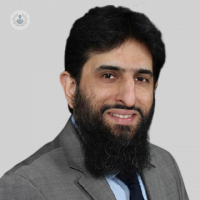How and why is rotator cuff repair surgery performed?
Written by:In this article below, esteemed consultant orthopaedic surgeon, Mr Mohammed Abdus-Samee, details what rotator cuff repair surgery entails, and what recovery time from the operation looks like.

What is rotator cuff repair, and why do people undergo this procedure?
It is an operation performed to repair one or more of the tendons that are deep inside the shoulder. It is usually done via keyhole surgery, but it can also be done via an open incision.
People undergo this procedure usually because a loss of function and/or unresolved or severe shoulder pain. The tear is normally found after an MRI or ultrasound scan.
What is involved in keyhole rotator cuff surgery?
The operation is a day-case procedure performed under a general anaesthetic. Once the patient is in theatre, a few small keyhole incisions are made around the shoulder to allow the surgeon to pass a small camera and various other keyhole instruments into the shoulder.
The actual repair is usually done via strong threads that have to tie the tendon back onto the bone. The way that we do that is by attaching these threads to anchors that are deep inside the bone. After the operation, small sutures are put over the incisions and dressings are applied to the incisions.
Is the procedure painful?
It can be painful. General and local anaesthetic are used for pain relief and to minimise pain as much as possible. Strong painkillers are prescribed after the local anaesthetic wears off.
What is recovery time like?
It takes two weeks for the wounds to heal. People can get back to normal activities when the pain is at a reasonable level. Patients can start to drive again after roughly six weeks after the operation. In terms of being able to resume full activity, you are normally looking at a time between six and 12 weeks.
Patients should avoid getting the wounds wet during this recovery time if possible. The physiotherapists’ advice should be strictly followed. People who have undergone this surgery should also avoid heavy lifting or any intense physical exertion for the first three months after surgery.
To book a consultation with Mr Mohammed Abdus-Samee, simply visit his Top Doctors profile today.


